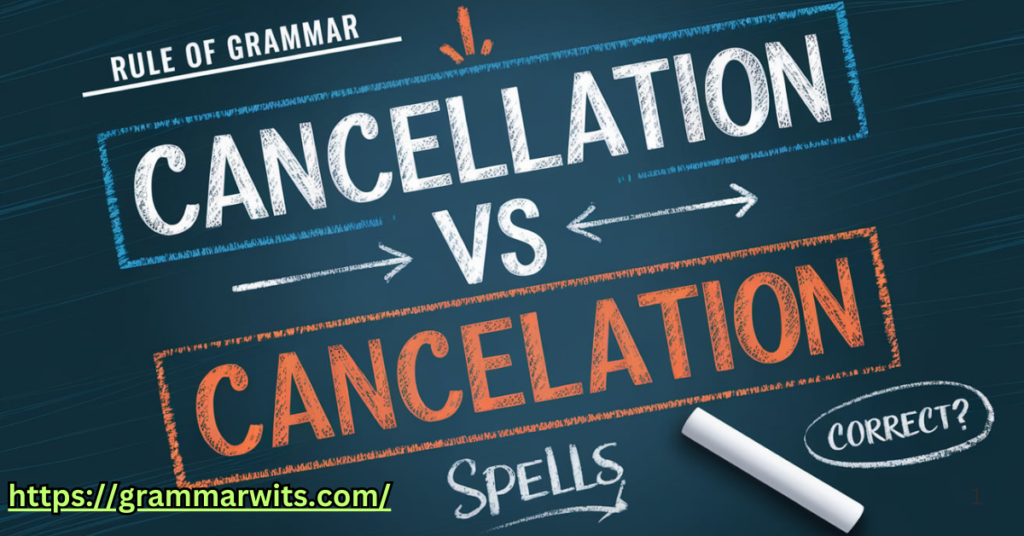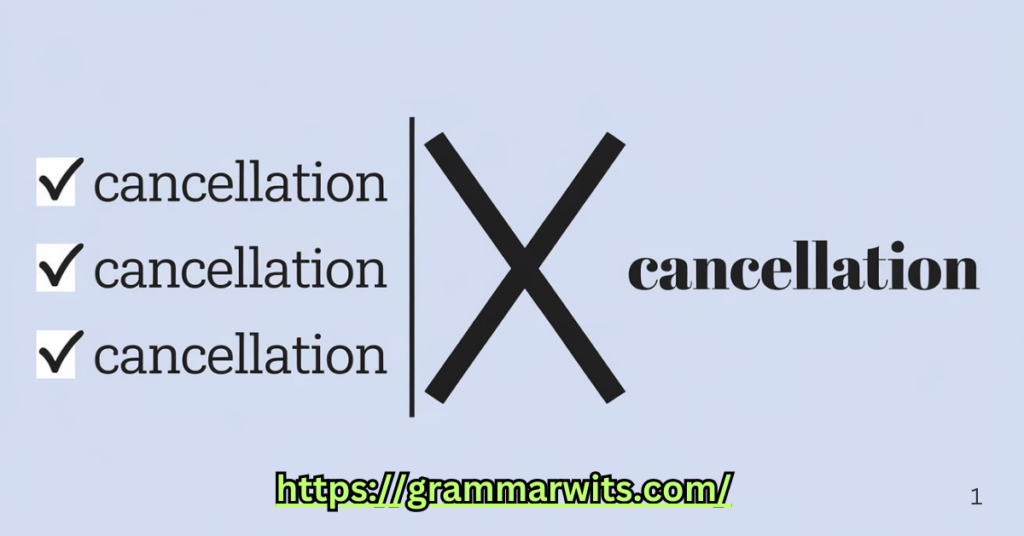The phrase “cancellation vs. cancelation which spelling” refers to the spelling debate between these two variations of the same word. While both versions exist, “cancellation” (with a double “L”) is the standard form in British English and most American English sources. “Cancelation” (with a single “L”) appears occasionally in older American texts but is much less common. The difference stems from English spelling conventions, influenced by historical changes and linguistic simplifications.
Nothing disrupts a polished piece of writing like inconsistent spelling. Whether writing a business email, a social media post, or an academic paper, using the correct spelling enhances credibility and professionalism. A simple choice between “cancellation” and “cancelation” can impact readability, audience trust, and even search engine rankings for digital content.
Understanding “cancellation vs. cancelation which spelling” is crucial for mastering English grammar rules. While both spellings have historical roots, one is universally preferred in modern writing. Knowing when and where to use the correct form will help you communicate clearly and effectively.
Why Is There Confusion Between “Cancellation” and “Cancelation”?
English is notorious for inconsistent spelling rules, and cancellation vs. cancelation is a perfect example. The confusion arises because both spellings appear in written texts, yet one is more commonly accepted.
The main reason for the difference comes from how American English and British English evolved separately. While British English retained the double “L” in many words, American English simplified some spellings. This has led to words like:
| British English | American English |
|---|---|
| Travelling | Traveling |
| Cancelling | Canceling |
| Labelled | Labeled |
| Modelled | Modeled |
Although cancelation exists, most dictionaries and grammar guides favor cancellation as the correct spelling.
What Do “Cancellation” and “Cancelation” Mean?

Both words refer to the act of calling off or ending an event, agreement, or service. However, spelling preferences differ.
Definition of “Cancellation”
- Cancellation (with double “L”) is the standard spelling in British English and most American English sources.
- It appears in dictionaries like Merriam-Webster, Oxford, and Cambridge.
Example sentences:
✔️ The airline announced the cancellation of over 200 flights due to bad weather.
✔️ Her subscription cancellation was processed immediately.
Definition of “Cancelation”
- Cancelation (single “L”) is an alternative spelling that appears occasionally in American English but is not widely accepted.
- Many style guides and spell-checkers flag cancelation as incorrect.
Example sentence:
✔️ Some older American publications still use cancelation, though it is less common.
Cancellation vs. Cancelation: Which Spelling is Correct?
If you want to follow standard grammar rules, cancellation is the correct spelling.
Here’s why:
- “Cancellation” is the dominant form in modern American English and British English.
- Dictionaries like Oxford, Merriam-Webster, and Cambridge list “cancellation” as the primary spelling.
- Major style guides, including The Associated Press (AP) and The Chicago Manual of Style, recommend “cancellation.”
Real-World Usage in Publications
A comparison of both spellings in books and newspapers shows clear trends:
| Publication | Preferred Spelling |
|---|---|
| The New York Times | Cancellation |
| The Guardian | Cancellation |
| Merriam-Webster Dictionary | Cancellation |
| Oxford English Dictionary | Cancellation |
| Some older American texts | Cancelation (rare) |
Even though cancelation appears occasionally in older American texts, cancellation remains the widely accepted spelling in formal writing.
Why Does American and British English Differ in Spelling?

The spelling divide between American and British English is largely due to Noah Webster, an American lexicographer who reformed English spelling in the early 19th century.
Webster believed English spelling should be simpler and more logical. He introduced changes that removed double letters from words, creating the American spelling conventions we see today.
For example:
- Travelling → Traveling
- Labelled → Labeled
- Theatre → Theater
However, not all changes were adopted uniformly. While canceled (with one “L”) became common in American English, cancellation retained its double “L” in most dictionaries and style guides.
Examples of “Cancellation” and “Cancelation” in Context
Seeing words in real-world contexts can clarify their correct usage. Below are examples from different fields:
Business & Services
✔️ Event cancellation policies protect customers from unexpected changes.
✔️ The last-minute cancellation of hotel bookings can result in fees.
Travel & Airlines
✔️ Due to bad weather, the airline announced the cancellation of 50 flights.
✔️ Always check your airline’s flight cancellation policy before booking.
Legal & Contracts
✔️ The contract cancellation required both parties to agree.
✔️ Subscription services often allow easy cancellation without penalties.
Synonyms for “Cancellation”
If you’re looking for alternative words, here are some common synonyms:
| Synonym | Example Sentence |
|---|---|
| Annulment | The court approved the annulment of the contract. |
| Termination | The company announced the termination of the project. |
| Revocation | The driver’s license revocation took effect immediately. |
| Rescission | The rescission of the agreement required a formal request. |
| Abolishment | The abolishment of outdated policies benefited employees. |
Etymology and Origins of “Cancellation”

The word “cancellation” comes from the Latin verb “cancellare,” which means “to cross out” or “to mark with lattice lines.”
Over time, the meaning shifted to represent the act of stopping or calling off something.
- 16th century: The word appears in Middle English texts as “cancellacion.”
- 18th century: British English standardized “cancellation” with a double “L”.
- 19th century: American English introduced “cancelation”, but it remained uncommon.
FAQs
1. Which is correct: cancellation or cancelation?
“Cancellation” (with a double “L”) is the correct and widely accepted spelling in both British and American English.
2. Is “cancelation” a real word?
Yes, but “cancelation” (with one “L”) is rarely used and considered an outdated variation in American English.
3. Why does American English sometimes use one “L” in words like “canceled”?
American English follows spelling simplifications introduced by Noah Webster, leading to forms like “canceled” instead of “cancelled”.
4. Do dictionaries recognize both spellings?
Most modern dictionaries list “cancellation” as the standard spelling and “cancelation” as a less common alternative.
5. Should I always use “cancellation” in professional writing?
Yes, “cancellation” is the correct and most professional spelling in formal, academic, and business writing.
Conclusion
Choosing the correct form in “cancellation vs cancelation which spelling” depends on consistency and audience. “Cancellation” with a double “L” is the widely accepted spelling in both British English and American English. While “cancelation” appears in some older American texts, it is rare in modern usage. Using the standard spelling ensures clarity, professionalism, and adherence to proper grammar rules.
When writing, sticking to “cancellation” avoids confusion. Whether for business, academics, or casual use, spelling matters. Knowing the difference in “cancellation vs cancelation which spelling” helps improve communication and prevents errors. Choosing the widely accepted form enhances credibility and ensures your writing aligns with standard English language conventions.

Alizy Smith is a passionate language enthusiast and the admin of Grammar Wits. With a love for wordplay, grammar quirks, and witty expressions, she’s dedicated to making language learning fun and accessible. From grammar tips to pun-filled laughs, Alizy ensures every piece of content entertains while educating — turning tricky rules into easy, enjoyable reads.
